American Farmer
Inspired by books and news specials and farmers markets, the foodie movement is driving droves of Americans to figure out exactly where their meals come from, and seek out food that wasn’t conceived by marketers.

Interview by Rosecrans Baldwin
When and why did this quest begin?
The farmer project began in 2004 while I was spending the summer with my family at our cabin in Northern Michigan. I was in a creative slump at the time, feeling a little burnt out from years of non-stop work as a commercial photographer. One morning, during a daily visit to the nearby diner, I looked over at a familiar group of regulars, local farmers from around the area shooting the breeze over a cup of coffee. And I saw some faces that I just instantly felt I had to photograph. I can’t tell you what made that day any different. It just was. By the end of that afternoon, I had photographed my first farmer. And I already knew, long before I ever saw a contact sheet, that I had taken the best photographs of my life. I made it a point to take those photos my way, and no one else’s. I didn’t analyze it, I just went for it. Continue reading ↓
These images are from Paul Mobley’s new book, edited by Katrina Fried, American Farmer: The Heart of Our Country (Welcome Books). All photographs used with permission, © 2008 Paul Mobley, text © 2008 Katrina Fried, all rights reserved.
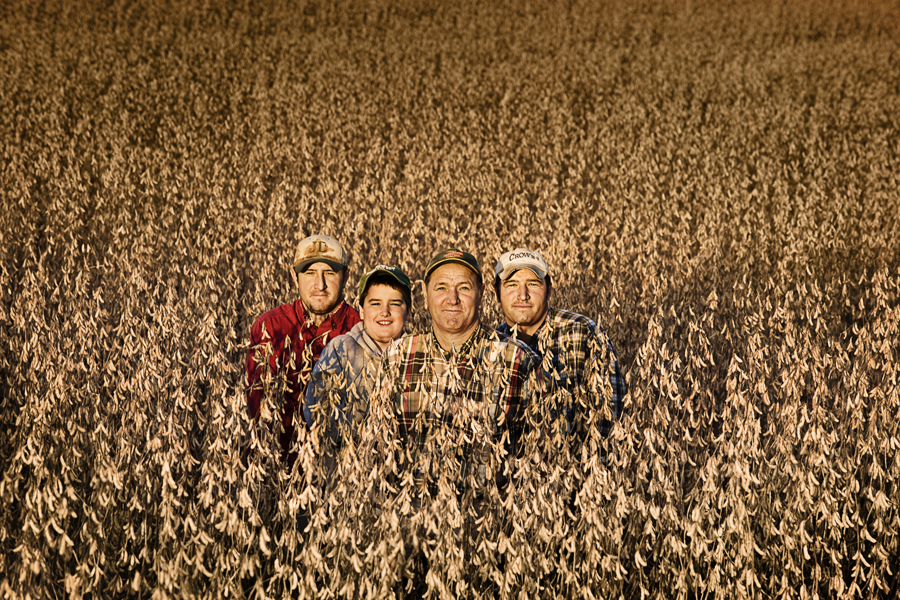
Pat Hardy with his sons, Brett and Brad, and grandson, Jacob, soybeans, Grant City, Missouri:
We started kind of a tradition after my oldest son got married. Every Sunday after church the three boys and their families come over for a meal. I get to just sit there and listen to them talking about whatever’s going on—I don’t have to say anything—and it makes me feel good to see how close they are and know that when I’m gone they’ll take care of each other. And those boys enjoy it as much as I do—I get a big kick out of that, too. I think it just started off with some fried chicken and it went from there.
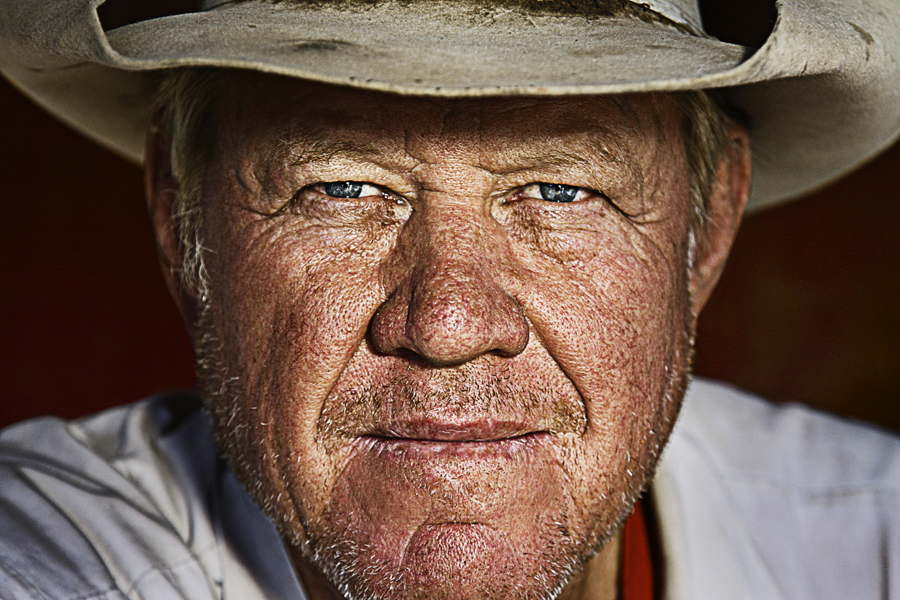
DeWayne Justice, citrus and livestock, Waddell, Arizona:
Neither of my parents went to college, but they were both readers. I don’t think a night went by when my mom didn’t read to us kids from the time we were little bitty. She’d bring home books from the library. This was before the age of television and there weren’t a whole lot of other things to do. I still love to read. I usually have about four books on my bedside table going at once. But with farming, you can’t get it out of a book. And you can’t get it off of a movie. You have to be there, you have to feel it. You can always judge by a man’s hands whether he makes his living off the land. There was an old gentleman who worked for me, and he never wore gloves. And when you shook hands with him it was like shaking hands with an old saddle.
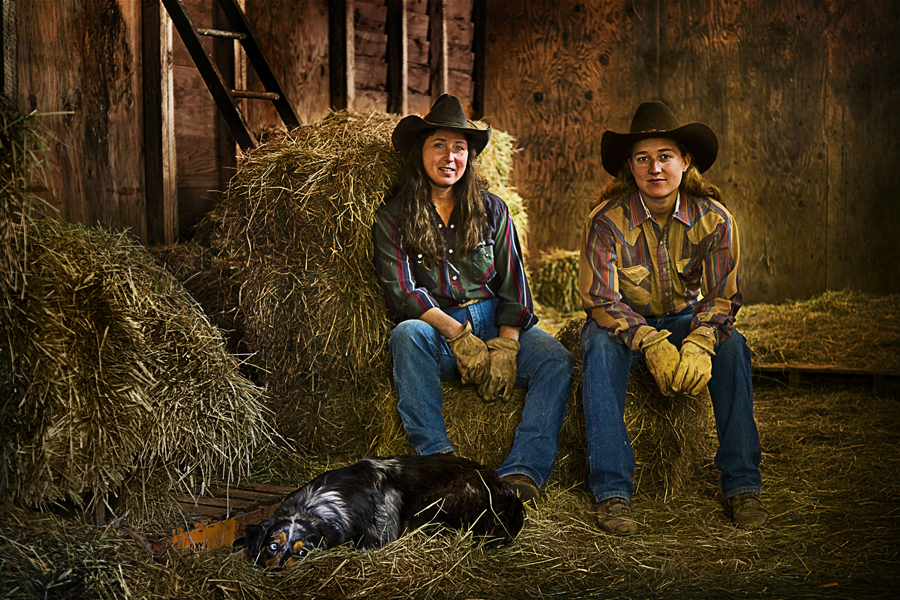
Shirley Schollenberg with her daughter, Katie, hay and horses, Ninilchik, Alaska:
Back in 1959, one of my uncles heard about free land in Alaska: you could homestead up to 160 acres and all you had to do was clear a small portion and live on the land for a short time and it was yours. My parents were the only ones who stayed and settled on that original parcel of land in a small community known as Happy Valley. We’re pretty modern nowadays, but we certainly weren’t when we first moved up here. I was probably in eighth grade before we got a television and a telephone. We used to do all of our communication with a CB radio. And I can certainly remember when we first got running water. That was a big deal—I was probably already in high school. My family always teased me—because this is a fishing village—that I was going to marry a fisherman. And I said, ‘No, I’m gonna marry a cowboy!’ Well, sure enough, I married a fisherman. He goes out on the boat around the first of June and is gone all summer. When he leaves, that’s about the time I start farming. So it’s really nice having Katie around. She’s 23 now. She has an outside job, but she certainly spends time on the tractor and training horses with me. One of the things that she always does first, after she’s been away for a little while, is get on her horse and ride to the beach. There’s a smell in the salt water that just makes you feel like you’re home.
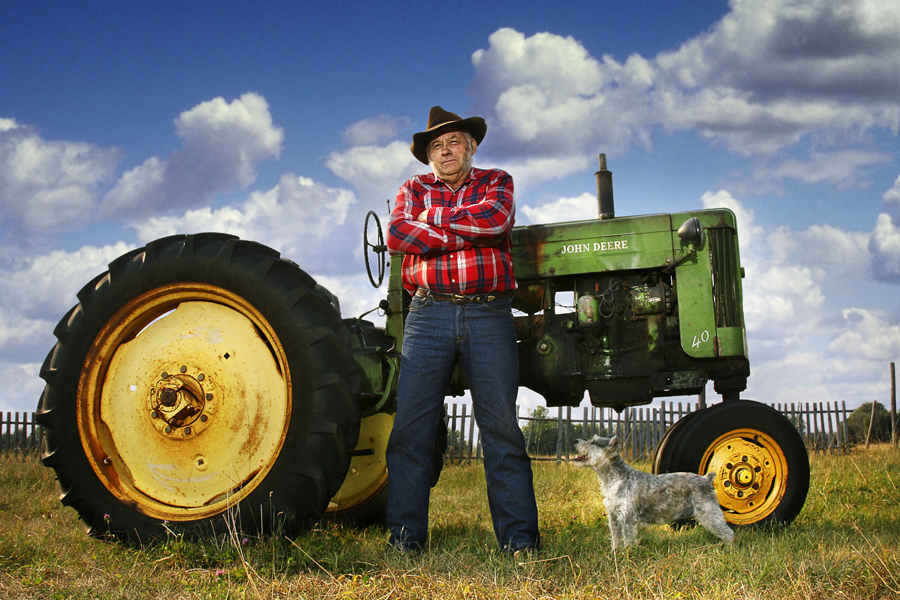
Jules Marchesseault, cattle, Dillon, Montana:
I turned 70 last fall and I’m still in relatively good health—outside of my elbows, my knees, my wrists, and my shoulders. We’ve got a wonderful life together, the two of us. It’s been a struggle many times because we came from the basement up—we didn’t have any money. I told somebody once, I said, “I didn’t go through the Depression, but I can tell you one thing, we had our own little depression.” Maybe nobody else knew that, but we sure did. But we were young and we had our health and those are the two things that can get you through a lot of hard times. I told Bonnie the other day, I said, “If you knew then what you know now…” She probably wouldn’t have said yes—she’d have told me good-bye.
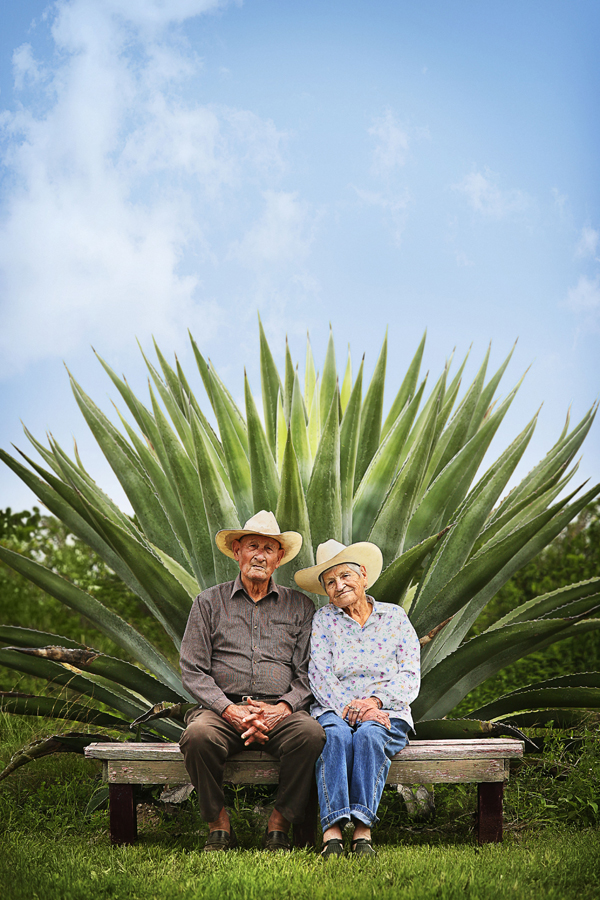
Catarino and Margarita Romero, corn and cotton, Mineral, Texas. Richard Romero (not pictured; son of Catarino and Margarita Romero):
My dad is 99 now, and my mom is 95. They still live at home and they’re very, very active. He stopped farming about 20 years ago. But he still keeps a garden. He gets out there and tills his little garden and fertilizes it and plants it and keeps it up. He keeps going all the time. And he still drives his old pickup. He had his license renewed not too long ago, and he says, “As long as my insurance covers me, I’m going to drive!” My mom never did drive, but she rides along with him, and my dad’s losing his sight pretty much, so Mom kind of guides him—you know, “You’re turning too close,” or, “Here comes a car, move to one side.” Everybody’s amazed at the life that they have. Everywhere you go, everybody knows mom and dad.
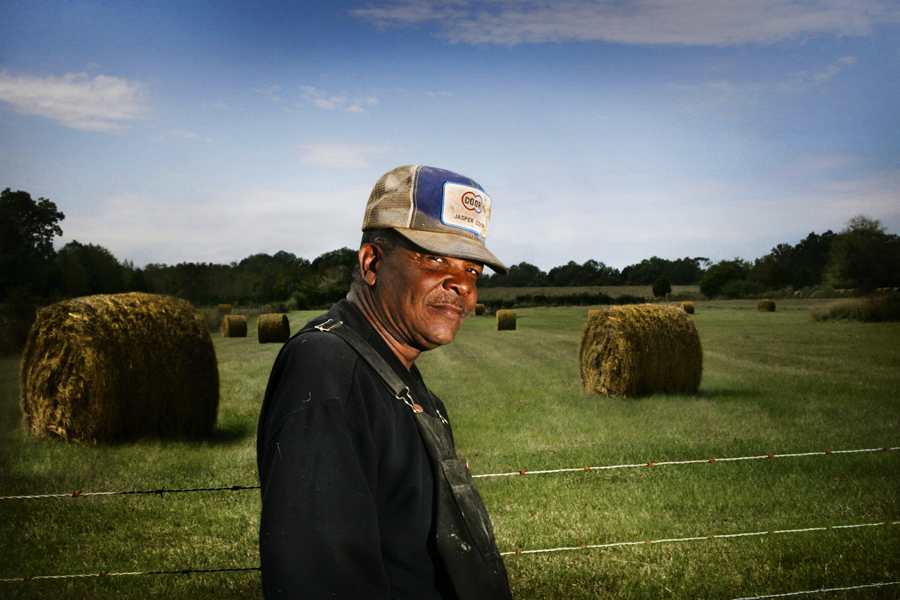
Chester Bradley, cattle, Rose Hill, Mississippi:
My wife died when our baby girl was seven years old—she’ll be 19 this year. We already had two girls in college, one in high school, and my youngest was in the second grade. I raised them all. I always told them, “If you want nice homes and nice cars, you can’t get them working at McDonald’s and the Chicken Poultry. You get your education, can’t nobody take that away from you.” That’s what I always instilled in them. What I like about cattle farming is being my own boss. I say I had a good life. I wouldn’t trade nothing for it. What I like best about it now is being around other farmers, and talking and competing against one another. I do enjoy that, seeing who can grow the most hay to the acre.
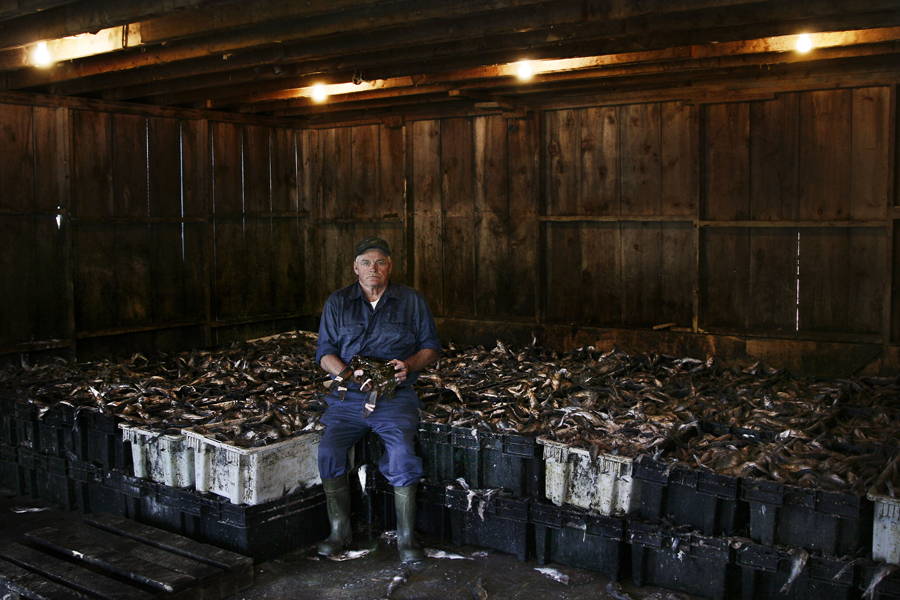
Owen Beal, lobsters, Millbridge, Maine:
In the off-season I preach every Sunday at the Church of Christ, from December to the first of May. I’ve been a preacher there for about 20 years. They needed someone to preach, so I started preaching. It’s hard for me to say whether I’m any good or not. But I have been told I have a loud voice. We have a small congregation of about 50, and everybody knows each other so it’s more like preaching to friends. My wife, my daughters, and the 10 grandchildren always come to hear my Sunday sermon. My wife could eat lobster every day of the week. Myself, I’d rather have crabmeat, but I can still enjoy a lobster. I suppose boiling and dipping it in butter is one way, and there’s things a lot worse than a fresh Maine lobster roll, but I like it fried best of all. You boil the lobster and let it cool off and then fry ‘em in butter and eat ‘em that way. It’s real good. As a matter of fact, that’s what I had for my supper tonight.
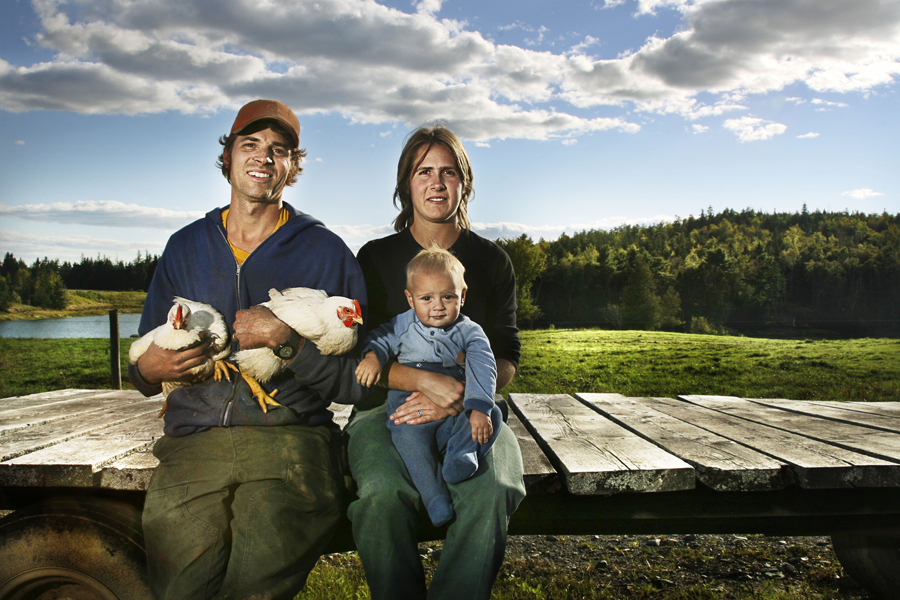
Aaron Bell and Carly Delsignore with their son, Henry, organic dairy, Edmunds, Maine. Jane Bell (not pictured; mother of Aaron Bell):
We all know with farming, it’s just very precarious; you’re hanging on by your fingernails, often with the whims of the weather. We once lost 14 head of cattle in a single strike of lightning. Aaron and Carly had a beautiful herd of purebred Hereford cows, just fat and healthy, and many moms and yearlings. And then on June 29th, 2005, we had a little microburst here. Picnic tables went flying and it was bolt after bolt of lightning. Aaron was in a tractor in the middle of a field, and he didn’t think he was going to get out alive. We didn’t find the cows for a day. Nobody really did a head count right away. Fourteen were killed by one bolt of lightning. Seven of them were due to calve within a month, so it was really like losing 21. We worked from eight in the morning until three in the afternoon burying them. Just a horrendous day. It was a horrible feeling of loss and probably a little anger that, of all the thousands of trees, why did it have to be the one the cows were under? They were supposed to be Carly and Aaron’s down payment for the organic dairy herd. A lot of people say, “Well, you had them insured, didn’t you?” But in eastern Maine, do you insure cows from lightning? Whoever heard of such an absurd thing? Of all the 200 years worth of stories about this place, it’s the first time we know of animals dying from lightning. Well, their cows are insured now. But you had to be thankful that none of the houses were hit, and no humans died. You had to be thankful for that.
Interview continued
In retrospect, I think what I responded to was the simple purity of the photographs, both the way they were taken and the men and women I was photographing. The farmers I’ve met these past four years are, without exception, the most humble, authentic, and generous people I’ve ever known. I sought them out, because every time I captured that goodness on film, I became a better person myself. I love the way farmers live. I love the way they treat others. I love the way they respect the earth. The communities they’ve created and live in are as close to a perfect world as I can honestly imagine.
How is the independent American farmer faring these days?
This is an amazing thing to say, but it’s absolutely true: All the farmers I photographed seemed genuinely happy with their life; a remarkable notion given the unprecedented struggles they’re facing today. For many, these are the toughest times they’ve ever had—but you’d never know it. They’re too proud. I know they all worry about the future, about the well-being of the next generation, but another day is a good day to them. They simply take whatever the world gives them, and they give back as much as they possibly can. No rain? We’ll scrape by. Too much rain? We’ll replant. Never once did I get the feeling that they would ever consider doing anything else. They love what they do—and it’s the purest love you can imagine. No matter the conditions that test their mettle, they never give up or doubt their purpose. Retirement is almost unheard of, because for the farmer life is work. I remember a farmer telling me his philosophy on life: “The harder I work the luckier I get.”
There’s a growing movement among non-farming Americans—let’s say the Michael Pollan-ites—to know where our food comes from, and many aren’t pleased when they learn about the corporate food industry. Were your ranchers and farmers seeing the interest?
I know that most are aware of the growing interest, and certainly some of the organic and younger farmers I met are more involved in the evolving politics of food, but I think for the majority of farmers, it has very little impact on the way they farm. They all feel they do the very best they can to produce the highest quality product possible; that’s what they’ve always done and will continue to do. They definitely believe that what they farm is of much higher quality than what the corporate guys churn out. But I think that the public conversation that’s been taking place about the way we should be thinking of and consuming food, is largely seen by the farmers as something that’s happening “out there”—in the cities and among those who’ve never lived or worked on a farm. Most farmers I met are far more concerned with how they’re going to scrape up the money to pay for repairs to a broken tractor before the fall harvest, or outlast the worst drought they’ve ever been through without having to sell off some land—a prospect akin to cutting of a limb for them. In other words, they are struggling, day in and day out, just to survive—anything outside of that is a minor concern in comparison.
Which feels more “American” to you, the wide open spaces or the big cities?
I love the big city, but I miss the wide open spaces. Over the past four years venturing from one farm to the next, I had the ultimate sense of freedom. My worries and anxieties would fly out the car window every time I hit the road. If I didn’t answer the cell phone, who cared? If I got myself lost taking a back road detour, so what? Those small, but monopolizing, city concerns were irrelevant on my rural journeys. Though every homecoming was a very happy reunion with family and friends, I’d soon find myself itching for the next trip into the cornfields, the pastures, the vast horizons. It’s a different way of life out there. Is either one more American? I don’t think so. But in my opinion, you’ll find the very best of America in those wide open spaces.
What comes next?
I’m not sure what comes next. I’m still riding the euphoria of my four-year journey. I’m back to my commercial work, touring for the book, and promoting farming during my breaks. I’ve become very fond of the elderly while working on American Farmer. Maybe a project on growing older would be interesting. A celebration of life and wisdom. In the meantime, I still have over 300 farmers to reminisce about. It feels good.
